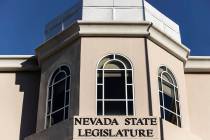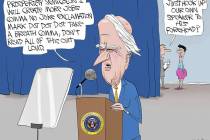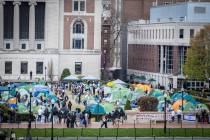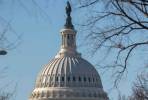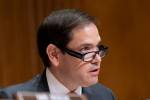Capitalism as social culture
This world has a checkered history of financial crises -- recessions, depressions, inflation, unemployment, crashing commodities markets. The ones we are facing today are nothing unique. So perhaps we can learn from history.
Solon may have been the first to come up with a toxic asset relief program when he was named archon of Athens in 594 B.C. Free trade and easy money had led many Athenians to overextend their credit. Their collateral was their children and themselves.
When they defaulted they became slaves.
Solon dipped into the treasury and bought back all Athenians citizens held in slavery outside of Athens, freed the rest and declared all debts null and void.
Julius Caesar may have been the first Keynesian. After crossing the Rubicon in 49 B.C. and conquering Rome, he canceled all interest on debts, not the principal, just the interest, and then put people to work by funding massive public works projects.
Asked at a recent lecture on the campus of UNLV how to address the poverty and economic woes of today, historian Joyce Appleby basically replied: Let loose the dogs of capitalism.
Appleby was addressing an overflow audience for the seventh annual Judge Philip Pro Lectureship in Legal History at the Boyd School of Law. The series is named for Las Vegas' longtime federal judge and champion of constitutional and legal education.
Using her book, "The Relentless Revolution: A History of Capitalism," as her outline, Appleby traced capitalism from its roots in ancient commerce through the industrialization of England and the United States to the phenomenon of micro-loans today, the roots of the current recession and the path out of it.
Appleby, professor emerita of UCLA and a former newspaper reporter, described capitalism as not so much an economic endeavor but a fundamental part of social culture and a way of thinking and living by taking risks and creating wealth and profits through innovation.
"A view of democracy was developed in America," she said, "which emphasized the protection of individual rights, not the power of the people in government as they saw fit. When we think about democracy we most often think about rights and the whole thing about majority rule. The optimum function of the economy was given priority over democratic self-government. The one was considered as natural, the other as artificial. The economy was natural. The government was artificial."
She credits much of the nation's path to vibrant, wealth-building capitalism to two men -- Chief Justice John Marshall and third President Thomas Jefferson. Strangely enough, as Appleby points out in her book and lectures, Marshall was appointed by Federalist John Adams to keep a rein on Republican Jefferson, but instead became an ally in attacking state conferred monopolies, various contract breaches and attempts to restrain commerce.
"Jefferson's economic policy became apparent during his first term. ... " Appleby lectured. "In many ways it was a policy of default, decentralization, noninterference, opening up access to the country's resources, land. Where the federalists had expected the mercantile elite to fund new initiatives with their capital, Jeffersonian practices helped local entrepreneurs to build up sweat equity with borrowed money from the banks."
It was entrepreneurship built on a lack of aversion to risk.
Appleby went on to observe, "Some historians have presented capitalism as foisted on common men and women by outsiders, but I think they missed the central feature of free-market economies. No one can predict the consequences of cumulative decisions. That's what rules in the market -- cumulative decisions, to invest or to buy or sell."
Sounds a bit like Adam Smith's invisible hand.
Then I was taken aback a bit by her apparent admiration for the theorems of John Maynard Keynes.
I asked her about that afterward. She stated sometimes stimulus from the government is needed to aright a listing economy. In her book she discusses the between world wars back and forth battle for the hearts and minds and wallets of politicians in the United States and England between Keynes and archrival Milton Friedman, who advocated a hands-off approach and letting the market take care of itself.
She concluded, "Keynes came out the better in the contest of ideas while the countries themselves suffered from following Friedman's prescriptions."
Sounds like a very visible heavy hand trying to influence those unpredictable cumulative decisions.
The trouble with trying to judge the efficacy of economic stimulation is that the whole world is the laboratory and there is no way to run side-by-side experiments to see which works better. In the short run, it is hard to tell if stimulus improved the economy or prolonged the problem. In the long run, as Keynes famously said, "we're all dead."
Appleby closed by saying, "Participants can shape the future of capitalism." It is just a question of how they do that, I guess.
We'll see how these principles and lessons of history play out in Carson City and Washington, D.C.
Thomas Mitchell is senior opinion editor of the Review-Journal. He may be contacted at 383-0261 or e-mail at tmitchell@reviewjournal.com.










